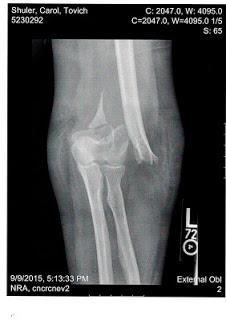
Arizona cop Jeff Bonar punches Marissa Morris in the face.
(From nydailynews.com)
The incident, which started when Flagstaff cop Jeff Bonar and sheriff's deputy Joel Winchester tried to evict Marissa Morris and others at her residence, has profound resonance here at Legal Schnauzer. It has so many similarities with our cop-related experiences in Alabama and Missouri that it's hard to keep up with them all.
But here is our best effort to show how the various cases converge, the truths we can take from them. Taken together, the cases indicate you can be subjected to gross police abuse, no matter where you live in the country:
(1) Rogue cops have an almost innate instinct to lie about abuse of the public --
In Arizona, Officer Bonar wrote in his report that Morris had kneed him multiple times, including once in the groin, prompting him to strike her. Deputy Winchester makes no mention in his report of any aggressive behavior on Morris' part, other than repeatedly stating (correctly) that she did not have any outstanding warrants for her arrest. In Missouri, my wife Carol was slammed to the ground and an unknown officer yanked so violently on her arms that one of them was snapped in two, and the other was purple from extensive bruising. Greene County Sheriff Jim Arnott, inexplicably, was on the scene, standing about five feet away when Carol was assaulted. He immediately stated that Carol had "assaulted a police officer." I knew this statement was false because I saw the whole event from about 20 feet away, and Carol did not say or do anything to prompt the assault. She had been given permission to enter the apartment to retrieve our belongings -- as had I -- and that's what she was trying to do.
(2) Be wary when law enforcement is on hand for an eviction --
Both of these cases involved evictions. Our understanding is that sheriff deputies (usually one or two) are on hand to make sure evictions go smoothly, with the landlord's staff and tenants doing most of the work. Ours involved eight to 10 officers and probably close to a dozen assault rifles and handguns. Best we can tell, the Arizona eviction was legitimate. Ours had been stayed, by law, when we timely filed a notice of appeal in our court case. Did that have any impact on rogue cops? Nope. They had no lawful grounds to be on the Missouri property, much less to barge through the door, start waving firearms around, handcuff us, and eventually commit a brutal assault on Carol.
(3) Cops might try listening to citizens once in a while --
In Arizona, Marissa Morris repeatedly tried to tell Bonar that she did not have an outstanding warrant -- and she proved to be correct about that. Did Bonar listen to her? No, he punched her in the face. In Missouri, as I was sitting handcuffed on the lawn outside our apartment (why was I handcuffed for an eviction?), I repeatedly told Arnott that execution of our eviction was stayed because we had timely filed a notice of appeal (and paid the filing fee) within the 10-day window allowed by law. He repeatedly turned his palms upward and shrugged his shoulders, as if he had no clue about Missouri law -- on a subject he is entrusted with handling.
(4) Cops don't seem to care if they hurt someone, even women --
Marissa Morris apparently took a punch to the face without being hurt too badly. This must be one tough woman -- or perhaps Bonar hit her more with his palm than with his fist. The punch had to have hurt, and Morris was fortunate to escape without a broken nose or other structural damage. As for our situation in Missouri, X-rays show that Carol's left arm was essentially snapped like a twig, with the break so extreme that it required trauma surgery -- and she likely will never regain more than 75 percent use of her arm.
(5) Cops aren't big on showing warrants or offering explanations for their actions --
According to a report at copblock.org, Morris asked Bonar to see a copy of any warrant for her. He didn't show her a warrant, and he did not explain what any warrant was supposed to be about. I can identify with that. When Alabama deputy Chris Blevins entered our home, knocked me to a concrete floor three times, and doused me with pepper spray, he did it all without showing a warrant, stating he had a warrant, or stating his reason for being on our property. When told by a judge at my resisting arrest trial to produce copies of any warrants, assistant DA Tonya Willingham said she didn't have any. I've still never seen one. Copblock.org used the term "kidnapping" to describe what happened to Marissa Morris, and since I also was taken without a warrant, I've used the same term to describe my experience.
(6) Cops will hit you with a "resisting arrest" charge simply for questioning their actions --
Both Arizona officers alleged in reports that Morris "resisted." As noted above, I actually went to trial in Alabama for "resisting arrest" and was found guilty -- even though a dashboard camera caught Blevins walking into our garage without stating his reason for being there. It captures him asking me to step outside, and me telling him to (in so many words) get the hell out of our house. Under Alabama law, an arrest is unlawful when an officer enters premises without stating his reason for being there. In fact, a citizen has both a right, and a duty, to resist an unlawful arrest -- and an officer has no lawful grounds to use any force in an unlawful arrest. Morris and I acted 100 percent within our rights, but she still got punched in the face -- while I got pummeled, doused with pepper spray, and thrown in the slammer for five months.
(7) Cops and cover-ups seem to go hand in hand --
Based on press reports, it appears Officer Bonar participated in a cover-up. His report said Marissa Morris kneed him multiple times, including in the groin, while another cop on the scene made no mention of any kneeing or kicking. (Note: I've had the misfortune of being hit in the "delicates" a time or two while playing sports, usually baseball. Some advice for you young sprouts out there -- never take to a baseball or softball diamond without a cup firmly in place. No matter how uncomfortable a cup might feel, you will be glad you had one on if a ball makes direct contact with the "family jewels.") If Morris actually had kneed Bonar in the groin, I feel quite certain the officer would have been on his hands and knees, wanting to puke up his guts. His report makes no sense, and the words of another officer, indicate Bonar flat-out lied. Here in Missouri, I've written several posts about the Greene County Sheriff's Office Policies and Procedures Manual, which is supposed to govern investigations regarding use of force. The posts, which include links to the manual online, can be viewed here, here, and here.

X-ray of Carol Shuler's arm,
broken by a sheriff's deputy
What does that tell you? It tells me that Sheriff Arnott's department has not followed its own policies and has never conducted an investigation, serious or otherwise, about what happened during our eviction.
(8) Cops have ways of taking their body cams out of commission --
A report at CBS News on the Arizona incident included the following:
Bonar was wearing a body camera, but according to his own police report, he turned it off before approaching Morris.
Why would an officer turn off his body cam before approaching someone? (For that matter, why are body cams made so that officers can turn them off?) I can think of only one answer: Bonar knew he was likely to rough up Morris, and he wanted to make sure there was no video evidence of it. Fortunately, Morris' friends and family members were on hand to make sure the punch was captured on video. (From my research, evictions normally are under the control sheriff's departments. It's not clear why Bonar, a city police officer, was on the scene. Did he have some beef with Morris, or someone close to her, and appeared with the intention of roughing her up?)
Was there a similar mindset at play in Missouri, with us? I have little doubt about it. I suspect any cameras were removed or turned off, and if one was operational, I imagine its contents have been destroyed. We believe one police vehicle might have been parked in a way that it would capture the assault on Carol -- if it included a functioning dash camera.
Many Americans still like to think cops are looking out for them, doing that "protect and serve" thing. But if you've actually had a close encounter with a cop, you are likely to know the truth -- a lot of them are lying scumbags and bullies, who apparently take delight in hurting others and trying to cover up their misdeeds.
We've witnessed it in Alabama and Missouri, and reading about the recent case in Arizona brings a lot of that trauma back home.
